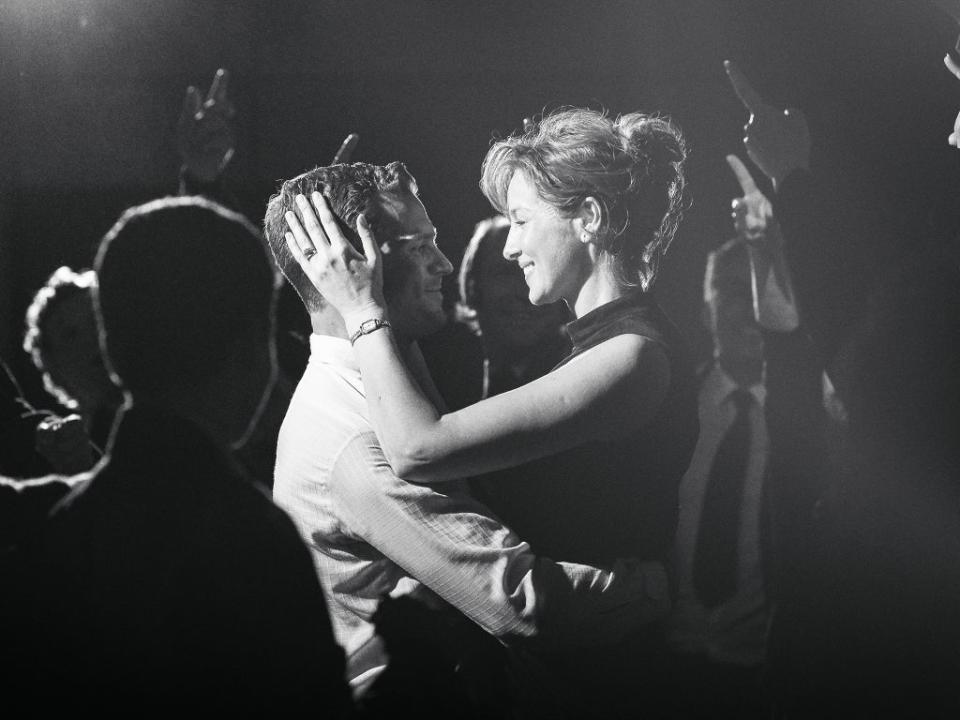Belfast film review: A film about the Troubles that isn’t about the Troubles at all

Dir: Kenneth Branagh. Starring: Caitríona Balfe, Judi Dench, Jamie Dornan, Ciarán Hinds, Colin Morgan, Jude Hill. 12A, 98 minutes.
Kenneth Branagh’s Belfast is a film about the Troubles that, when you dig into it, isn’t so much about the Troubles at all. A twinkly-eyed childhood memoir – and rigorously fashioned to be an Oscar frontrunner – it’s set during the cold months of 1969, when outbursts of sectarian violence across Northern Ireland marked a change in the air. It’s now recognised as the very start of a three-decade conflict, leaving scars still far from healed.
The Troubles drive the central conflict of the film, as two parents – played by Caitríona Balfe and Jamie Dornan – make the most difficult decision of their lives: do they leave Belfast and the only home they’ve ever known, or risk the safety of their two young sons? They are a Protestant family living in a majority Protestant area, but coexisting peacefully with their Catholic neighbours. But, to some, not taking a side is the same as taking a side. Fire and shattering glass do not discriminate.
There is a lopsidedness, though, to Belfast’s point of view, which comes out just as tilted as the Dutch angles that Branagh’s become so reliant upon as a director. We experience events as its protagonist does, youngest son Buddy (Jude Hill, funny and innocent) serving as a stand-in for Branagh’s own childhood self. The film, then, jolts with excitement every time Buddy bundles himself into the seat of a local auditorium, and gazes up in wonder at a screening of Chitty Chitty Bang Bang or a production of A Christmas Carol. Belfast, above all, exists to detail how its director would one day become that multi-hyphenate titan of the British arts, as famous for his exuberant takes on Shakespeare as he is for hamming it up in the Harry Potter films.
While Belfast largely plays out in black and white, Buddy’s early exposure to the arts is rendered in ecstatic explosions of colour. When coupled with the only other use of colour – in a tourist reel of a prologue accompanied by the bluesy beat of Van Morrison – these sequences suggest that the arts of Branagh’s youth allowed him to look directly into his own future. Belfast feels precious in that way, but also a little slight. As a monochrome memoir, the film superficially shares much in common with Alfonso Cuarón’s Roma, which revisited the director’s childhood in Mexico City through the eyes of his family’s one-time domestic worker. But the souls of these films feel worlds apart. Branagh doesn’t seem as eager as Cuarón to interrogate his own memories, or to reckon with how the protective veil of one’s parents can shield a child from reality.
The minor-key pleasure of daily, juvenile toils will do nicely instead. Buddy fosters a crush on a schoolmate and attempts to steal sweets from a local shop. His parents seem so glamorous and impossibly noble that they could surely have only been conjured up by the memories of a beloved child. Dornan possesses the quiet, romantic intensity of a man just trying to do right by his family; Balfe carries her resilience with a regal elegance. Their characters are tremendously in love – the film’s best scene is one where father croons “Everlasting Love”, while mother dances in the warm embrace of a spotlight. Buddy’s grandparents (Judi Dench and Ciarán Hinds), meanwhile, have been married for so long that they now seem to work in perfect sync – they dance and sing, too, while doling out advice with the kind of majesty that only actors like Dench and Hinds can confidently deliver.
The real talk – violence, religion, identity, politics – appears only in short, sharp bursts. And true hatred is far too conveniently condensed into a single, straightforwardly villainous figure (Colin Morgan). There’s an artificial neatness to Buddy’s world: ground that seems like it’s never been walked on before; gates that have been barely touched by passing hands. That’s easily explained by the fact that, due to the pandemic, Branagh elected to shoot on a studio backlot instead of a real street. But it might better serve his vision of Belfast – one that’s not so much about the lives we lead, but the ones the silver screen allows us to dream of.

 money
money 